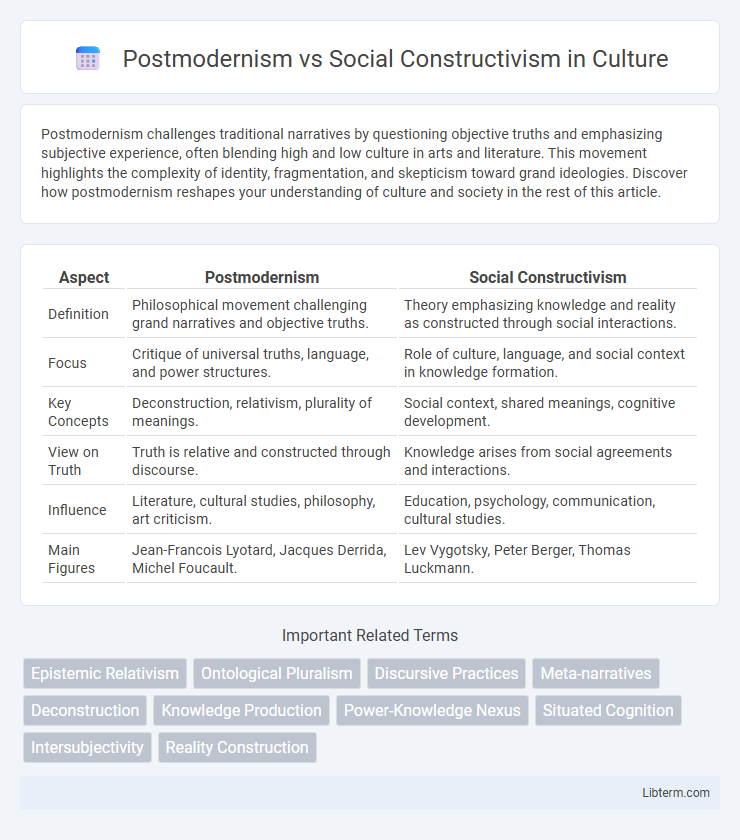Postmodernism challenges traditional narratives by questioning objective truths and emphasizing subjective experience, often blending high and low culture in arts and literature. This movement highlights the complexity of identity, fragmentation, and skepticism toward grand ideologies. Discover how postmodernism reshapes your understanding of culture and society in the rest of this article.
Table of Comparison
| Aspect | Postmodernism | Social Constructivism |
|---|---|---|
| Definition | Philosophical movement challenging grand narratives and objective truths. | Theory emphasizing knowledge and reality as constructed through social interactions. |
| Focus | Critique of universal truths, language, and power structures. | Role of culture, language, and social context in knowledge formation. |
| Key Concepts | Deconstruction, relativism, plurality of meanings. | Social context, shared meanings, cognitive development. |
| View on Truth | Truth is relative and constructed through discourse. | Knowledge arises from social agreements and interactions. |
| Influence | Literature, cultural studies, philosophy, art criticism. | Education, psychology, communication, cultural studies. |
| Main Figures | Jean-Francois Lyotard, Jacques Derrida, Michel Foucault. | Lev Vygotsky, Peter Berger, Thomas Luckmann. |
Understanding Postmodernism: Key Concepts
Postmodernism challenges universal narratives and objective truths, emphasizing skepticism toward grand ideologies and embracing relativism in knowledge and reality. It critiques foundational concepts, promoting pluralism, fragmented identities, and deconstruction of power structures within social and cultural contexts. These key concepts contrast with Social Constructivism's focus on shared meaning-making processes and the social origins of knowledge.
Defining Social Constructivism: Foundational Ideas
Social Constructivism emphasizes that knowledge and reality are actively constructed through social interactions, language, and cultural contexts rather than existing independently. It posits that understanding is shaped by communal processes, historical settings, and shared meanings, highlighting the role of collaboration and communication in learning. This foundational idea contrasts with Postmodernism's broader skepticism towards meta-narratives by specifically focusing on how meaning is co-created within specific social frameworks.
Historical Origins of Postmodernism and Social Constructivism
Postmodernism emerged in the mid-20th century as a reaction against the certainty of Enlightenment thinking and the grand narratives of modernism, emphasizing relativism, skepticism, and the deconstruction of established truths. Social Constructivism developed mainly during the late 20th century, rooted in the works of theorists like Vygotsky and Berger and Luckmann, focusing on how social interactions and cultural contexts shape knowledge and reality. Both theories challenge objective knowledge but differ in their historical contexts: Postmodernism critiques meta-narratives broadly, while Social Constructivism centers on the construction of knowledge through social processes.
Core Differences: Postmodernism vs Social Constructivism
Postmodernism challenges the existence of objective truths and emphasizes the role of power, language, and discourse in shaping knowledge, whereas Social Constructivism focuses on how social interactions and cultural contexts collectively construct understanding. Postmodernism often critiques grand narratives and highlights pluralism and relativism, contrasting with Social Constructivism's emphasis on collaborative meaning-making processes and the development of knowledge through social practices. The core difference lies in Postmodernism's skepticism about fixed realities compared to Social Constructivism's attention to the social origins of knowledge within specific communities.
Epistemology in Postmodernism and Constructivism
Postmodernism's epistemology challenges objective knowledge by asserting that all understanding is contingent on social, cultural, and linguistic contexts, emphasizing the plurality of truths and skepticism towards grand narratives. Social constructivism focuses on knowledge as actively constructed through social interactions, where reality is mediated by collective meanings and shared experiences within communities. Both paradigms reject absolute objectivity, but postmodernism critically deconstructs knowledge structures, while social constructivism explores how knowledge emerges through cooperative processes.
Reality, Truth, and Knowledge: Contrasting Perspectives
Postmodernism challenges the existence of objective reality, arguing that truth is fragmented and knowledge is contingent upon cultural and linguistic contexts. Social Constructivism emphasizes that reality and knowledge are co-created through social interactions and shared meanings within communities. Both perspectives reject absolute truths, highlighting how power dynamics and social processes shape our understanding of reality and knowledge.
Influence on Education and Learning Theories
Postmodernism in education challenges universal narratives and promotes multiple perspectives, emphasizing the deconstruction of knowledge and encouraging critical thinking about power structures within curricula. Social constructivism influences learning theories by asserting that knowledge is co-constructed through social interactions, with key theorists like Vygotsky highlighting the role of language and cultural context in cognitive development. Both frameworks reshape educational practices by fostering learner-centered environments that value diversity, collaboration, and the contextual nature of knowledge.
Critiques and Controversies Surrounding Both Theories
Postmodernism faces criticism for its relativism and skepticism toward objective truths, which some argue undermines scientific inquiry and ethical standards. Social Constructivism is often challenged for potentially downplaying biological and material realities by emphasizing social processes in knowledge formation. Both theories provoke controversies over their impact on epistemology, with debates centering on the balance between subjective interpretation and empirical evidence.
Applications in Contemporary Society
Postmodernism challenges absolute truths and highlights the subjective nature of knowledge, influencing contemporary art, literature, and media by promoting diverse narratives and skepticism toward grand narratives. Social constructivism emphasizes the role of social interactions and cultural context in shaping knowledge, impacting education systems and organizational behavior by encouraging collaborative learning and inclusive practices. Both frameworks facilitate critical analysis and empower marginalized voices, driving social change and innovation in policy-making and community development.
Conclusion: Navigating Postmodernism and Social Constructivism
Navigating Postmodernism and Social Constructivism involves recognizing that both challenge traditional notions of objective truth by emphasizing the role of language, culture, and power in shaping knowledge. Postmodernism critiques grand narratives and highlights the fragmentation of meaning, while Social Constructivism focuses on the collaborative construction of knowledge through social interactions. Understanding their complementary insights enables a more nuanced approach to analyzing complex social realities and epistemologies.
Postmodernism Infographic

 libterm.com
libterm.com